STREET ARTISTS IN EUROPE - Fondazione Fitzcarraldo
STREET ARTISTS IN EUROPE - Fondazione Fitzcarraldo
STREET ARTISTS IN EUROPE - Fondazione Fitzcarraldo
You also want an ePaper? Increase the reach of your titles
YUMPU automatically turns print PDFs into web optimized ePapers that Google loves.
Street Artists in Europe<br />
discover performances. Of the total, 77% lived in the Comminges area. These findings confirm<br />
the success of Pronomade(s) residency work in inducing the local population to appropriate an<br />
artistic and cultural project.<br />
4.2.2. Audience inclusion in performances<br />
New audiences are likely to be reached by the development of art projects that involve the<br />
people in the very act of creation. Such enterprises are precarious and complex. The artists have<br />
to be very clear about the status and function they allocate to the inhabitants involved. There are<br />
a great many methods of involving local people in performances, from conversations used as the<br />
basis for writing to theatre workshops where games that are played form the heart of the<br />
creation. Although some of those methods are not specific to street arts, the publicising of<br />
performances in the public space gives that act a particularly strong and symbolic significance<br />
for those concerned.<br />
This principle of inclusion is the ultimate step in the encounter between the artist and the<br />
population he seeks to address. The mobility of artists in Europe therefore seems as important as<br />
the mobility of the audiences themselves. The confrontation with others, through the medium of<br />
art, may have as much effect on the artists as on the population concerned. Cutting across<br />
frontiers and languages, common issues emerge, evidence of the cross-border nature of Europe<br />
and the concerns of its inhabitants.<br />
For five years Square Télévision, a local street project, has been broadcast in 25 towns, in<br />
France, Belgium, Austria and Portugal: ‘The broadcasting context is the neighbourhood. We go<br />
out and meet people and capture their stories: we project their words and pictures on the basis of<br />
an oral declaration of trust. From one country to the next, we find common themes, concerned<br />
with the regeneration of a neighbourhood, the transformation of public space … and still a few<br />
differences in everyday urban life’ 362 .<br />
The example of the KompleXKapharnaüm collective illustrates this, whilst not being the only<br />
striking example of that encounter between artists and the people which lies at the heart of<br />
artistic creation. All artists who have had the opportunity to encounter audiences from other<br />
countries tell of that interchange and of the benefits it brings them and their art.<br />
Conclusions<br />
• The fundamental issue for art and culture, in every European country, is how to enable<br />
the largest possible number to experience cultural works. Without being Messianic, we<br />
can say that street arts are pointing the way to new methods of engaging with the people,<br />
underlining the fact that attendance at a performance cannot be a kind of pause in the<br />
process of the discovery of art.<br />
• In France, as in other countries, the desire to move away from festivals responds to the<br />
artists’ fundamental desire to engage with people who have not been reached by culture.<br />
Within that dynamic, and with the prospect of a Europe of regions and neighbourhoods,<br />
the development of alternative promotional projects based on working in a particular<br />
neighbourhood over a long period of time is evidence of the capacity of street arts to be<br />
an instrument of local development and of uniting audiences.<br />
362 Duforeau Pierre, quoted in, Martin-Lahmani Sylvie, ‘La ville: médium et message’, in Rue européenne, op. cit.<br />
(no page numbers).<br />
223<br />
PE 375.307






